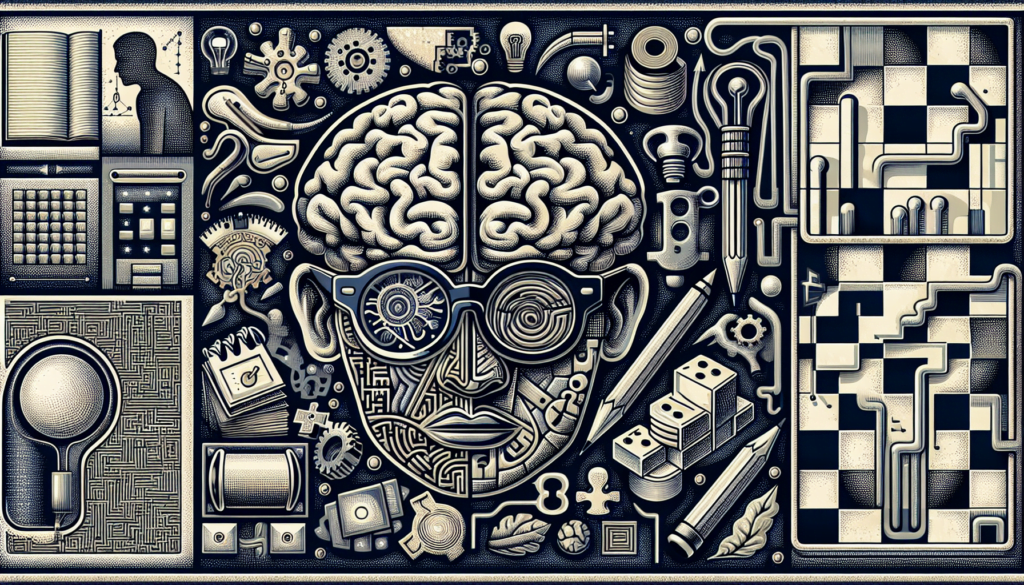In the intricate tapestry of human thought, cognitive biases are the subtle threads that often lead us astray. These biases, invisible architects of perception, shape our reality in ways we seldom recognize. Understanding these biases is not just an academic exercise; it is a journey towards self-awareness and better decision-making.
Key Takeaways
- Cognitive biases are systematic patterns of deviation from norm or rationality in judgment.
- Recognizing these biases can improve decision-making and critical thinking skills.
- Various types of cognitive biases influence our beliefs, decisions, and memories.
- Strategies to mitigate the impact of cognitive biases include education and structured decision-making.
- The concept of cognitive biases is subject to criticism and ongoing debate.
Introduction to Cognitive Biases
Definition of Cognitive Biases
Cognitive biases are the psychological tendencies that cause the human brain to draw incorrect conclusions. These are not random errors but systematic patterns of deviation from norm or rationality in judgment, which occur in particular situations, leading to perceptual distortion, inaccurate judgment, illogical interpretation, or what is broadly called irrationality.
Importance of Understanding Cognitive Biases
Understanding cognitive biases is crucial because they can lead to flawed decisions and judgments that affect various aspects of life, including business, education, and personal relationships. By becoming aware of these biases, individuals can take steps to counteract their effects, leading to more rational thinking and better outcomes.

Types of Cognitive Biases
Belief Biases
Confirmation Bias
Confirmation bias is the tendency to search for, interpret, favor, and recall information in a way that confirms one’s preexisting beliefs or hypotheses. It is a type of cognitive distortion that affects the ability to perceive reality objectively.
Belief Perseverance
Belief perseverance occurs when individuals hold on to their beliefs even when presented with evidence that contradicts them. This bias demonstrates the difficulty in revising beliefs once they have been established.
Decision-Making and Behavioral Biases
Anchoring Bias
The anchoring bias is the human tendency to rely too heavily on the first piece of information offered (the “anchor”) when making decisions. This initial anchor can significantly impact subsequent judgments and decisions.
Availability Heuristic
The availability heuristic is a mental shortcut that relies on immediate examples that come to a person’s mind when evaluating a specific topic, concept, method, or decision. The ease with which examples come to mind is often used as an indicator of frequency or probability.
Memory Biases
Misattribution of Memory
Misattribution of memory involves the ability to remember information correctly but being wrong about the source of that information. This can lead to the creation of false memories and has significant implications in various fields, including legal settings.

The Impact of Cognitive Biases
Influence on Economics
Cognitive biases can have profound effects on economic behavior, influencing everything from stock market trends to consumer purchasing decisions. For instance, the anchoring bias might cause investors to hold onto stocks based on their initial purchase price rather than current market conditions.
Effects on Psychology
In psychology, cognitive biases can affect the therapeutic process, as clients and therapists alike may fall prey to misjudgments based on these biases. Understanding cognitive biases is therefore essential in the field of cognitive restructuring.
Consequences for Decision-Making
Cognitive biases can lead to poor decision-making in personal and professional contexts. For example, confirmation bias might cause a manager to overlook critical information that does not align with their existing beliefs, leading to suboptimal business strategies.

Strategies for Reducing Cognitive Biases
Education and Awareness
One of the most effective strategies for reducing cognitive biases is education and awareness. By learning about these biases, individuals can recognize them in their thought processes and take steps to mitigate their effects.
Structured Decision-Making Processes
Implementing structured decision-making processes can also help reduce the impact of cognitive biases. These processes involve steps such as gathering diverse perspectives, considering alternative hypotheses, and conducting systematic evaluations of evidence.

Theoretical Causes of Cognitive Biases
Information-Processing Shortcuts
Cognitive biases often arise from information-processing shortcuts, known as heuristics. These mental shortcuts are used to ease the cognitive load of making decisions but can lead to biased thinking.
Emotional and Moral Motivations
Emotions and moral values can also influence cognitive biases. For example, individuals may make decisions based on what feels right, rather than what is supported by evidence, leading to biased outcomes.
Social Influence
Social influence plays a significant role in the formation of cognitive biases. The opinions, behaviors, and norms of others can heavily influence an individual’s thoughts and actions, often leading to biased judgments.
Limits on Information Processing
The human brain has limited capacity to process information, which can contribute to the development of cognitive biases. When faced with complex information or the need for quick decisions, biases are more likely to occur.

Individual Differences in Cognitive Biases
Influence of Personality
Personality traits can influence the susceptibility to different cognitive biases. For example, individuals who are more open to experience may be less prone to confirmation bias, as they are more willing to consider new information.
Role of Intelligence
Intelligence also plays a role in cognitive biases. While one might assume that higher intelligence would correlate with fewer biases, research suggests that even highly intelligent individuals are not immune to these mental pitfalls.
Impact of Education
Education can impact the prevalence and intensity of cognitive biases. A higher level of education may provide individuals with tools to recognize and counteract biases, although it is not a foolproof solution.
Criticism of Cognitive Bias Concept
Debate on Adaptiveness of Biases
There is debate within the scientific community about the adaptiveness of cognitive biases. Some argue that these biases may have evolved as advantageous shortcuts under certain conditions, while others view them as maladaptive.
Classification Challenges
The classification of cognitive biases is challenging due to their vast number and overlapping characteristics. This complexity can make it difficult to study and understand these biases comprehensively.
Methodological Concerns
Methodological concerns also arise in the study of cognitive biases. Critics argue that some biases may be artifacts of experimental design or the interpretation of researchers, rather than true psychological phenomena.

Cognitive Biases Tricking the Brain
Influence on Perception
Cognitive biases can trick the brain into perceiving things in a certain way, often leading to misinterpretation of information or situations. This can have significant implications for how individuals understand and interact with the world around them.
Irrational Decision-Making
These biases can lead to irrational decision-making, where choices are made based on flawed reasoning or incomplete information. Recognizing and addressing cognitive biases is therefore essential for improving the rationality of decisions.
Educational Tools and Resources
Critical Thinking Cards
To combat cognitive biases, educational tools such as critical thinking cards can be used. These cards present common biases and provide strategies for avoiding them, serving as a practical resource for individuals looking to enhance their decision-making skills.
The Thinking Shop
The Thinking Shop is another resource that offers materials designed to support cognitive bias awareness. Products such as books, games, and workshops can help individuals learn about biases in an engaging and interactive way.
Supporting Cognitive Bias Awareness
Joining Support Initiatives
Joining support initiatives focused on cognitive bias awareness can provide individuals with a community of like-minded people who are committed to understanding and mitigating the effects of biases.
Obtaining Educational Materials
Obtaining educational materials on cognitive biases is another way to support awareness. These materials can range from academic articles to more accessible content, such as infographics and videos, which explain biases in a user-friendly manner.
In conclusion, cognitive biases are the silent influencers of our thoughts and decisions. By understanding and addressing these biases, individuals can unlock a more accurate view of the world and make better choices. Whether through education, structured decision-making, or community support, the journey towards overcoming cognitive biases is one that promises greater clarity and effectiveness in all areas of life.
Unravel the Mysteries of the Mind: Your Cognitive Biases FAQ Journey
What is a cognitive bias?
A cognitive bias is a systematic pattern of deviation from norm or rationality in judgment, whereby inferences about other people and situations may be drawn in an illogical fashion. Cognitive biases are often a result of your brain’s attempt to simplify information processing and are influenced by a variety of factors including social, emotional, and cognitive factors.
How do cognitive biases affect decision-making?
Cognitive biases can significantly affect decision-making by causing us to make judgments that are not based on rational analysis or actual evidence. These biases can lead to overconfidence, the overlooking of important information, and the misinterpretation of data, which can result in flawed decisions that may have negative consequences in various aspects of life, including business, personal relationships, and education.
Can you give examples of common cognitive biases?
Certainly! Some common cognitive biases include confirmation bias, where individuals favor information that confirms their preconceptions; anchoring bias, where the first piece of information encountered heavily influences subsequent judgments; and the Dunning-Kruger effect, where people with limited knowledge or competence in a domain overestimate their own ability.
Why do cognitive biases exist?
Cognitive biases exist as a byproduct of the brain’s attempt to process information efficiently. They are mental shortcuts, known as heuristics, that help us make quick decisions without the need for detailed analysis. While these shortcuts can be helpful, they can also lead to inaccurate or illogical conclusions.
Are cognitive biases always bad?
Not necessarily. While cognitive biases can lead to poor judgments and decisions, they can also be adaptive in certain situations by enabling faster decision-making when time is limited or when processing all available information is impractical. However, being aware of these biases is crucial to mitigate their potential negative impact.
How can we reduce the influence of cognitive biases?
Reducing the influence of cognitive biases involves becoming aware of them and actively questioning our own thoughts and decisions. Techniques such as seeking out opposing viewpoints, considering the source of information, and taking time to make decisions can help counteract biases. Additionally, education and training in critical thinking and decision-making can improve our ability to identify and manage cognitive biases.
Do cognitive biases affect everyone?
Yes, cognitive biases are a universal aspect of human psychology and affect everyone to some degree. However, the extent and impact of these biases can vary among individuals, depending on factors such as education, experience, and cognitive abilities.
Is there a way to measure the impact of cognitive biases?
Measuring the impact of cognitive biases can be challenging due to their pervasive and often subtle nature. However, researchers use various experimental methods and observational studies to assess how biases influence behavior and decision-making. These studies can provide insights into the strength and consequences of different cognitive biases.
Can cognitive biases be beneficial in any way?
In some contexts, cognitive biases can be beneficial by enabling quicker decision-making when it’s not feasible to analyze all available information. For instance, the ‘availability heuristic’ allows us to make fast judgments based on readily available examples in our memory, which can be useful in urgent situations. However, it’s important to recognize when biases may lead us astray and to strive for more balanced and informed decision-making processes.
How do cognitive biases interact with social and cultural factors?
Cognitive biases are often influenced by social and cultural factors, as these can shape our expectations, beliefs, and the way we process information. For example, the ‘ingroup bias’ leads us to favor members of our own group over others, which can be reinforced by cultural norms and social identities. Understanding the interplay between cognitive biases and social influences can help us appreciate the complexity of human judgment and behavior.



